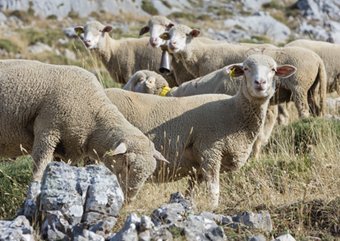Last August, Chinese authorities officially announced the lifting of the import ban on sheep and goat products from Spain, which had been in place since September 30, 2022, due to an outbreak of sheep and goat pox.
This decision, published in Bulletin No. 176/2025 of the General Administration of Customs and the Ministry of Agriculture and Rural Affairs of China, marks the end of a long-standing embargo that has had a severe economic impact on Spanish producers, especially with regard to wool and hides, two key byproducts for sheep and goat farming. During the duration of the ban, it is estimated that the sector has lost more than €45 million in revenue, as trade with one of the main international destinations for these products has been disrupted.

In recent years, China has established itself as the main international destination for sheep and goat wool and hides, concentrating a large part of the world’s processing capacity for these products. This situation is largely explained by the progressive dismantling of the textile and tanning industry in the European Union, a result of policies implemented in recent years. As a result, the Spanish sector increasingly depends on the Chinese market to ensure the valorization of these natural byproducts, essential for the economic sustainability of the extensive farming model.
Thanks to the joint work between INTEROVIC, the Ministry of Agriculture, and the diplomatic team in China, the trust of Chinese health authorities has been regained. Following the inspection carried out in Spain last June, Chinese health technicians positively assessed the measures implemented by the sector to eradicate the outbreak and strengthen biosecurity.
This resolution paves the way for the immediate resumption of sheep and goat wool and skin exports to China. This is long-awaited news for producers and the industry, allowing for value recovery, a reduction in surpluses, and a continued commitment to a sustainable and circular production model.
However, some technical details remain that require some time before shipments can resume. INTEROVIC is confident that this validation will occur soon, allowing for the complete reestablishment of trade.
Furthermore, this reopening marks a strategic turning point, as it allows for the reactivation of negotiations to open the Chinese market to the export of Spanish sheep and goat meat, a priority objective for INTEROVIC given China’s importance as the world’s leading importer of animal protein.
Sheep and goat wool and skin are traditional products of high quality and international prestige, with a long history linked to Spanish culture and rural economy. Therefore, its reopening to the Chinese market not only represents the recovery of a strategic export destination, but also the appreciation of an essential byproduct that contributes to sustainability, the comprehensive utilization of animals, and the sector’s profitability. As Raúl Muñiz, president of INTEROVIC, points out, “This is a fundamental step to strengthen the sector’s international competitiveness and guarantee the comprehensive utilization of animals, a key element in the profitability and sustainability of sheep farms.”
















